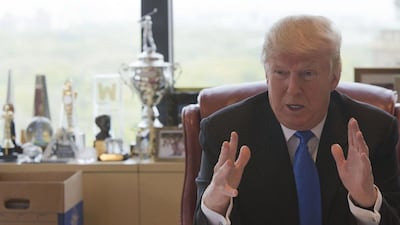There is something almost soothing about watching Dwight D Eisenhower’s 1952 US presidential campaign ad: “I like Ike!” Portraying an animated parade of marching citizens – and a musical elephant – the antiquated TV spot sings “hang out the banners, beat the drum, we’ll take Ike to Washington” in such an upbeat tone that it is almost hard to believe that it was a bona fide political broadcast.
The “Eisenhower Answers America” series of political ads – where Ike rails against high taxes and food prices – were more stern. Yet the very fact that US politics had room for such unbridled optimism showed that fear, at least in part, had not crudely seeped into political campaigning.
More than half a century later, fear is such a prevalent part of world politics that we would almost be lost without it. Even before wealthy Republican presidential hopeful Donald Trump called for a halt to Muslims entering the US last year, American politics had been awash with scaremongering. In this century alone, US TV viewers have been treated to Republican David Perdue who, running for the US Senate in 2014, hit voters square in the jaw with his images of ISIL pouring over the American border. And in the same year, the Republican National Committee asked the voting public to “vote [Republican] to keep terrorists off US soil”.
Negative campaigning has certainly not been confined to those shores either. In the UK, the June 23 European Union referendum has been the subject of hot debate. Leave campaigners have accused their opponents of stoking fear in a bid to persuade the British public to continue their decades-long EU association.
UK defence secretary Michael Fallon recently conjured up a whole plethora of threats when he said “leaving would only bring comfort to our enemies, whether they are sitting in Moscow or terrorists sitting in Raqqa”.
Scare tactics were even used during the campaign to change Britain’s voting system for Westminster in 2011. Here, one advert pictured a baby in hospitalised with tubes in her nose alongside the words: “She needs a new cardiac facility, not an alternative voting system”.
There’s nothing like fear to capture one’s attention. As products of our environment, fear can concentrate the mind like little else. Political strategists know this – which is why they use it and use it to great effect. Fear can have a legitimate place in political discourse. As this century’s atrocities in Paris, Brussels, London, Madrid, New York and all across the Arabic-speaking world and beyond testify, bad things often happen to good people. And we should rightly be warned.
But politics is about control – and gratuitously playing the fear card is about as low as it gets for power-hungry politicians seeking to persuade the electorate to put them into office, keep them in office or maintain the status quo.
In an age where the likes of ISIL are banded about for shock value, outgoing US president Barack Obama’s vote-winning “politics of hope” mantra, that saw him first elected to the White House in 2008, appears like something from a bygone age rather than from less than a decade ago.
Fear has today become an unmistakable stain on much of the conduct and discourse of global politics. Amplified by social media, it has gripped us all and made cynics of many. Fear scares the most vulnerable in our world – and appeals to the most bigoted.
And when it’s shamelessly exploited by Donald Trump et al, fear can work wonders on securing support from sections of society, as the billionaire’s “Make America Great Again!” campaign has found to its considerable electoral success.
But the very fact that he has pledged to mend his ways now that he is the presumptive Republican candidate tells you a lot about how he really views his current chances across America at large.
As Muslims continue to be removed from American planes – in one recent case for just speaking Arabic – such scaremongering has a lot to answer for.
Politicians everywhere have a responsibility to provide their electorate with hope, aspiration and inclusiveness – not to churn out baseless and spurious nightmares.
But as the political sentiments of “I like Ike” fade into the dim and distant past, the politics of fear appear a hard habit to break.
Alasdair Soussi is a freelance journalist, who has worked across Africa, Europe and the Middle East
On Twitter: @AlasdairSoussi

